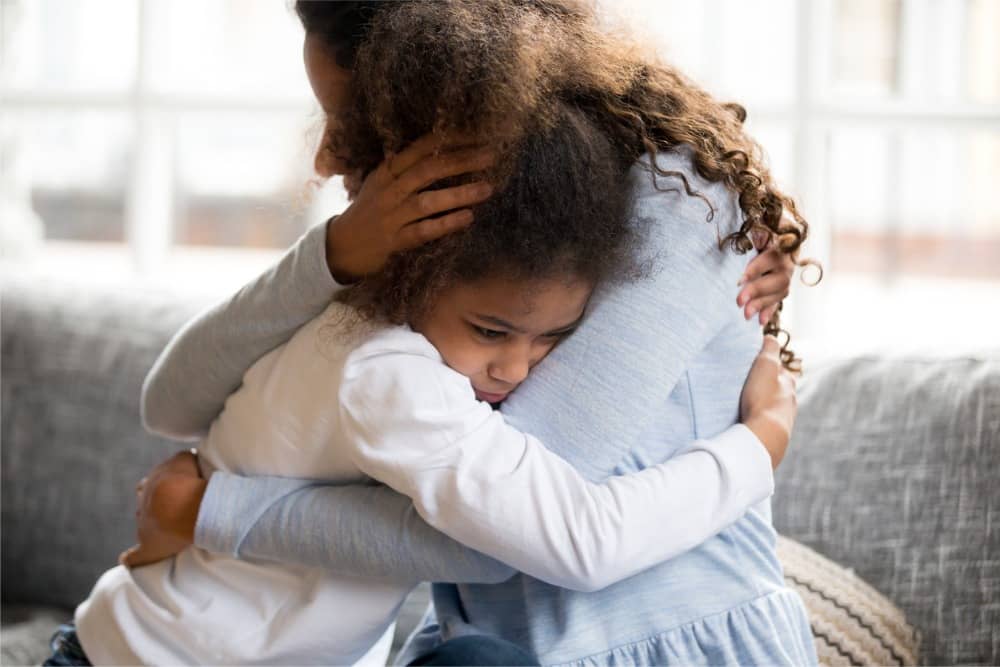5 Strategies for Easing Childhood Anxiety

As a parent or caregiver, it’s natural to feel concerned when your child experiences anxiety. The good news is there are steps we can take to help reduce anxiety in children, who are particularly susceptible to being overwhelmed due to their lack of world experience and still-developing brains. As your child navigates life and its stressors, finding ways to help them cope and reduce their anxiety is crucial. At Mile High Psychiatry, we offer guidance and support to help your family through this process. The following five tips can be used as a starting point to help reduce childhood anxiety.
5 Tips to Reduce Childhood Anxiety
As a parent, knowing how best to help your child with their anxiety may be challenging. Sometimes children hesitate to talk about their feelings and can be overwhelmed by their emotions. This can make it difficult to know your child is under stress and anxiety, to begin with. If you notice changes in your child’s behavior, it may be a sign they need help managing anxiety. Something as simple as talking to your child can be a significant first step to addressing their anxiety. With that in mind, here are five tips to help reduce childhood anxiety:
1. Acknowledge Your Child’s Feelings
Acknowledging your child’s feelings is essential in helping them reduce anxiety. Children often feel unheard and dismissed when their emotions are not acknowledged. Listening and validating your child’s feelings can help them feel seen and understood. Make sure to provide a safe space for your child to express their feelings. Listen to them without judgment and offer support and comfort.
Furthermore, use active listening techniques such as repeating back what they’ve said and asking clarifying questions to show you are fully present and engaged in the conversation. When you acknowledge your child’s feelings, they will feel validated and more comfortable opening up to you in the future. This creates a foundation of trust and support to help them manage their anxiety and build resilience.
2. Practice Relaxation Techniques
Between school, making new friends, and extracurricular activities, life can be quite overwhelming for children. Encouraging your child to practice relaxation techniques such as deep breathing, visualization exercises, and progressive muscle relaxation may be an excellent way to help them reduce anxiety. By regularly practicing the following relaxation techniques, your child can learn to keep their anxiety in check.
Deep Breathing Exercises
Deep breathing is a simple yet effective technique that involves taking slow, deep breaths in through the nose and out through the mouth. Encourage your child to focus on their breathing and count to four as they inhale and exhale. This may help slow their heart rate and promote feelings of calmness.
Visualization Exercises
Visualization involves imagining a peaceful and calming scene, such as a beach or a forest. Ask your child to focus on the details of the scene, using all their senses to make the visualization as vivid as possible. This can help distract their mind from anxious thoughts.
Progressive Muscle Relaxation
Progressive muscle relaxation involves tensing and then relaxing different muscle groups in the body. Encourage your child to tense each muscle group for a few seconds and then release the tension, starting from their toes and working their way up to their head.
3. Create a Calm Environment
Creating a calm environment is important for promoting relaxation and reducing anxiety. There are several ways to achieve this. To start, decluttering your child’s space may help create a sense of order and tranquility. Minimizing loud noises and creating an optimal sleeping environment are also essential. Keep electronics such as TVs, cell phones, and tablets away from the bedroom and establish a bedtime routine. A lack of sleep may contribute to feelings of anxiety, so make sure your child gets enough rest.
In addition, incorporating soothing scents such as lavender, chamomile, or vanilla can create a calming atmosphere. Moreover, painting your child’s room a soft and muted color, such as pastel blue or green, can promote peace and create a relaxing ambiance. Lastly, bringing in natural elements such as plants or a small water fountain may help create a refreshing environment and reduce anxiety.
4. Encourage Physical Activity
Encouraging your child to participate in physical activities can be helpful in easing anxiety for a number of reasons. Not only does physical activity release endorphins, but it may also be an outstanding outlet for stress and tension. Additionally, participating in team sports can help build confidence, social skills, and a sense of belonging. It is recommended children get at least an hour of physical activity per day, so make sure to motivate your child to stay active.
5. Create a Routine
Routines provide structure and predictability, which may help your child feel more secure and less anxious. When your child knows what to expect, it can reduce their sense of uncertainty and help them feel more in control. Moreover, routines can help establish healthy habits, such as regular sleep patterns and meal times, which may also contribute to overall well-being.
However, it’s important to remember that children also need some flexibility in their routines, as too much structure may be unhelpful when trying to reduce anxiety. Find a balance between routine and spontaneity to ensure your child does not feel overly restricted. Your child’s routine should be consistent and flexible to accommodate changes and unexpected events.
Help Reduce Childhood Anxiety with Mile High Psychiatry
Are you tired of seeing your child struggle with anxiety and don’t know how to help? At Mile High Psychiatry, we understand the impact anxiety may have on a child’s life and are here to provide the support and guidance they need to overcome it. Our team of experienced mental health providers offers a unique and personalized approach to anxiety treatment.
We believe in empowering children to actively develop the skills they need to reduce anxiety long-term. Contact Mile High Psychiatry today to schedule a consultation and learn more about our innovative treatment options. Together, we can help your child thrive and live a happy, healthy life.


